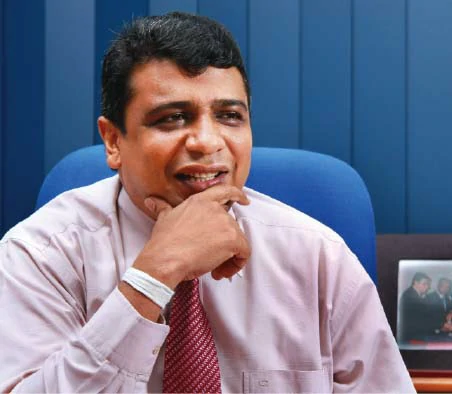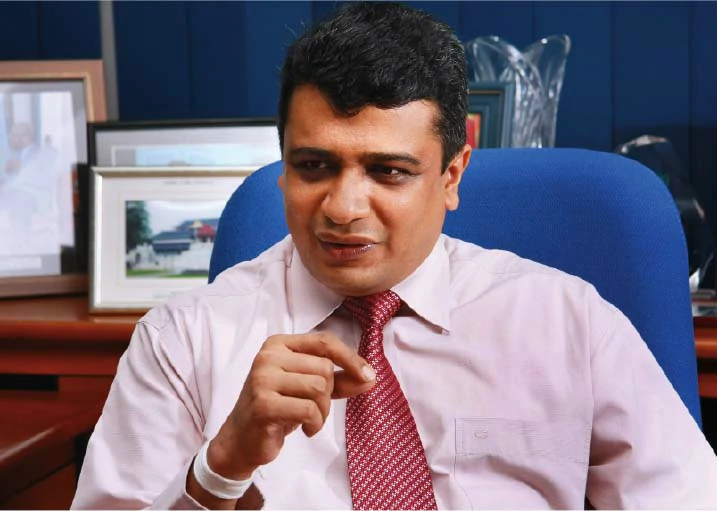
The Telecommunications Regulatory Commission of Sri Lanka (TRCSL), International Telecommunication Union (ITU) and the Commonwealth Telecommunications Organisation (CTO) have organised a Forum: Next Generation Network (NGN) Standardisation, which is the first of its kind in Sri Lanka. Priyantha Kariyapperuma, Director General of Telecommunications, TRCSL, speaks to Business Today on the significance of this event.
By Ayesha Inoon and Prasadini Nanayakkara
Photography by Menaka Aravinda
Tell us about the importance of this NGN forum, and how Sri Lanka came to be the host.
This is a unique opportunity for our country since it’s the first time that such a high-tech event is taking place – not only in Sri Lanka, but also in the region itself. ITU is the world body, which coordinates with all the regulators and makes recommendations on radio spectrum allocations for each country. It is the leading United Nations Agency for information and communication technology issues. In September 2008, the Secretary General of ITU Dr Hamadoun Toure visited Sri Lanka on the invitation of His Excellency the President Mahinda Rajapaksa. Commenting on the excellent development in telecommunications in the country, Dr Toure presented Sri Lanka with an ITU medal of excellence. During subsequent discussions, he agreed that Colombo could host such important forums.
Afterwards, when I visited the ITU head office, we agreed to host this NGN Standardisation Forum headed by Malcolm Johnson who is the Director of the ITU Standardisation Bureau.
What are the objectives of this forum?
If we speak about the evolution of technology in the telecommunication industry, GSM has been there for 17 years, and CDMA is quite well known. After sometime, the use of 3G, or third generation networks, also became known. This made video calls, texting and accessing the Internet on mobile phones possible – therefore now data has also become mobile whereas only voice used to be mobile.
Now the policy for the future is the mobile broadband, like mobile telephony – that’s why the theme of our event is ‘broadband for all’. That is, for you to have access wherever you go, if you have a device such as a computer, PDA or telephone. For this, technology has to evolve.
We Have Many Eminent Lecturers Coming From All Over The World, And We Expect Over 100 Participants From The Asia Pacific And African Region, Which Covers Over 80 Countries.
What is the next evolution in the telecommunications sector?
There is an interesting phrase, ‘Long Term Evolution’ or LTE. The next evolution step for today’s mobile systems is poised to offer a superior mobile broadband experience with higher speeds and simplified technology. But to turn the LTE promise into reality, the industry needs to address a number of issues, to ensure that the transition is as fast and as smooth as possible.
Technology needs to evolve. There is always an existing network for voice, but you have to give broadband data.
Who are the participants and speakers at this event?
We have many eminent lecturers coming from all over the world, and we expect over 100 participants from the Asia Pacific and African region, which covers over 80 countries. Out of 80 countries, 25 countries are sponsored by ITU.
Furthermore, we are proud to say that our Sri Lankan telecommunication industry is highly united. All the Sri Lankan operators are sponsoring various events at this forum.
What has been Sri Lanka’s progress in the telecommunication arena?
Our country has state-of-the-art technology in the telecommunication field. If you take any other infrastructure – whether it is power, highways, transportation, electric railways, tube trains or monorails – we are yet to acquire those. We are making a few highways and going in for coal power. One of these days we may go in for nuclear power – but this, is yet to happen. In tele communication however, the best technologies in the world are already here. We are on par with all the developed nations, we are ahead of the SAARC countries. Even India does not yet have the 3G technology, but we obtained it two years ago.
The credit for this goes to His Excellency the President. When he was Prime Minister, he spearheaded the nana sala projects. He has named 2009 as the year of IT and English. He has taken many initiatives to promote high technology in this industry.
Today we have over 11 million mobile phones, and nearly 4 million fixed lines. Additionally, the Internet penetration is extremely rapid. We boast of a high literacy rate and very soon we can also boast of a high ICT literacy rate as well. To achieve this, we must have accessibility to these technologies at a low cost. What’s the commodity that reduces in price all the time in this country? It is the telecom tariffs – not that customers ask for it, but the price is reduced because of the competition. I’m trying to introduce a broadband policy where everyone can afford data packages, and therefore perhaps, unlimited voice.
I Would Like To Invite Everyone Who Is Interested In Getting To Know About The New Technology, About The New World, To Participate In This Seminar.
What impact do you see this forum having?
Firstly Sri Lanka will get a very good image in the global telecom sphere. Furthermore, the ITU will recognise Sri Lanka as a good place to host this kind of event. We are just coming into a post war era, and this is the first conference of this kind to be held here. I would like to invite everyone who is interested in getting to know about the new technology, about the new world, to participate in this seminar – specially university students, people who are interested in the subject of technology, to get involved. Most of the papers will be published on our website, www.trc.gov.lk.
Finally, I must thank the media and those who have supported this, specially the operators, who have been very supportive. This is the beauty of giving the private sector the right opportunities. We’ve had excellent support from the private sector. Also, the Government is keeping in pace with the new policies, the new technologies and His Excellency in particular takes personal interest in looking after the industry, because he wants to bridge digitally divided societies. I would also like to thank ITU for selecting Sri Lanka, especially the Secretary General, Dr Toure. I am sure that we will continue to have such forums in the country in the days to come.






